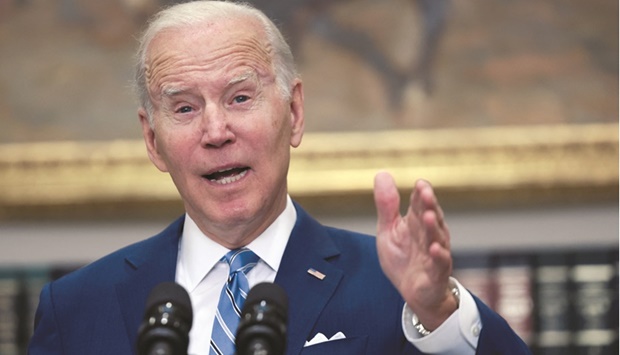Beijing yesterday said President Joe Biden’s latest comments that the US would defend Taiwan against a Chinese invasion “severely violate” Washington’s policy towards the island.
Washington cut formal diplomatic relations with Taiwan in 1979, switching recognition to Beijing as the sole representative of China — but it has maintained a decisive, if delicate, role in supporting the island since.
In an interview with US broadcaster CBS, Biden was asked whether US troops would defend Taiwan, and replied “yes”, if it were “an unprecedented attack”.
He went on to say that Taiwan makes its “own judgements” about independence and the US was not “encouraging...their being independent”.
“That’s their decision,” he said.
China reacted angrily yesterday, with foreign ministry spokesperson Mao Ning telling a regular press briefing: “The US remarks...severely violate the important commitment the US made not to support Taiwan independence, and send a seriously erroneous signal to Taiwanese separatist independence forces.”
“We are willing to make the biggest sincere efforts to strive for the prospect of peaceful reunification,” Mao said.
“At the same time, we will never tolerate any activities aimed at splitting the country, and reserve the choice to take all necessary measures.”
Tensions between China and the US are already higher than usual in the wake of a rare visit to Taiwan by Nancy Pelosi, a key Biden ally and speaker of the House of Representatives.
Last week, a US Senate committee took the first step towards directly providing billions of dollars in military aid to Taiwan and making ties more official.
The US approved a potential arms sale worth more than $1bn to Taiwan in early September, including 60 anti-ship missiles and 100 air-to-air missiles, which provoked anger from China.
“We urge the US side to fully recognise the extreme importance and high sensitivity of the Taiwan question...(and) earnestly implement the commitment made by US leaders not to support Taiwanese independence,” Mao added.
Biden’s comments appeared to depart from decades of US policy towards Taiwan.
While Washington does arm Taiwan, it has long maintained a policy of “strategic ambiguity” on whether it would intervene militarily if Beijing were to invade.
The policy is designed to dissuade both China from invading and Taiwan from formally declaring independence.

(File photo) US President Joe Biden


